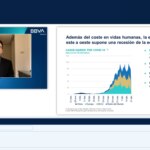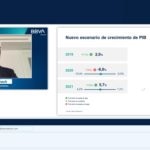BBVA Research expects Spain’s GDP to contract by 8 percent for 2020 and grow 5.7 percent in 2021
In its latest edition of 'Spain Outlook' - presented today by Jorge Sicilia, Director of BBVA Research Chief Economist of BBVA Group, and Rafael Doménech, Head of Economic Analysis of BBVA – BBVA’s research service estimates that the containment measures implemented to curb contagion rates and reign in the Covid-19 pandemic will cause Spain's GDP to decline 8 percent year-on-year (compared to its previous 1.6 percent growth forecast). The decline may drive to an unemployment rate above 20 percent this year. In 2021, as a result of the expected global recovery and the policies promoted by both European institutions and the government of Spain, Spain’s GDP growth rate could reach 5.7 percent year-on-year.

However, according to the report, due to the uncertainty surrounding them, the forecasts are subject to a downwards bias. Going forward, Spain’s economic performance will depend on the duration of the health-related lockdown, their impact on the different sectors, the effect of the public policies implemented and the global pace of recovery.
The contraction of economic activity is taking place at an extremely intense rate, especially in the social consumer sectors, the worst hit by containment measures. Thus, the 60 to 100 percent spending declines recorded in segments such as hospitality, transportation, tourism and entertainment over the past month compared to the same period of the previous year, will not be offset by the uptick in spending on food, health supplies and services, and specific online retail segments. Beyond the adjustment seen on the demand side, other available indicators - including Social Security enrollment in March, the scores of businesses that have applied for the government furlough scheme, or electricity consumption trends – also hint at significant drops on the supply side. All of the above seem to indicate that, despite striking late in the first quarter, the crisis might have already caused GDP to shrink by 3 percent (12 percent on an annualized basis) in said period, and that the impact will be even more significant during the second quarter.
The public policies rolled out so far have focused on fighting the disease, keeping demand from collapsing, preventing massive job losses and keeping businesses and companies from falling into insolvency while lockdown measures remain in place. Without these measures and those announced by EU institutions to keep risk premiums low and ease deficit targets, BBVA Research estimates that Spain’s GDP decline in 2020 could have been 3.5 percentage points steeper compared to its current forecast.

Jorge Sicilia, Chief Economist of BBVA Group, during the presentation of 'Spain Outlook 1T2020'
The decline and recovery in activity in Spain will be intense
Although the intensity of the economic slump will be historic, the recovery will also be swift. However, it will take time for economic activity to reach late 2019 levels. Spain’s recovery speed will be restricted by two defining features of its domestic economy.
The first is high job destruction rates, higher than in other countries, due to the country’s dependence on temporary contracts. The second is its high dependence on some of the sectors that will bear the brunt of restrictions, especially the industry sector. Income from foreign tourism accounted for around 6 percent of GDP in 2019 and 63 percent of it was recorded between April and September.
On the other hand, even in a scenario where a large part of the measures announced should not have more than a temporary effect on the accounts of public administrations, the public deficit is expected to rise by about 11 percent of GDP, causing the national debt to soar to around 115 percent of GDP in 2020.

Rafael Doménech, Head of Economic Analysis, during the presentation of 'Spain Outlook 1T2020'
A global recession is unavoidable, but the adopted measures will underpin recovery
A global recession is unavoidable, but the announced monetary and fiscal policy measures should dampen the decline in activity and underpin a partial recovery in 2021. Both the monetary and fiscal measures adopted in Europe should help avoid more persistent negative effects. In March, the European Central Bank (ECB) announced the roll out of new temporary asset purchase program, with a substantial overall envelope (€750 billion), and indicated that purchases will be conducted in a flexible manner.
Furthermore, the Eurogroup agreed an emergency rescue package (equivalent to 4 percent of the EMU GDP) and recognized the need for a recovery program, although there is still uncertainty about the funding of this coordinated initiative. The plan will be essential to prop up recovery at EU level, increase its symmetry between countries - benefiting those worst hit and/or less fiscal leeway - and strengthen the European project.

Miguel Cardoso, Chief Economist, during the presentation of 'Spain Outlook 1T2020'